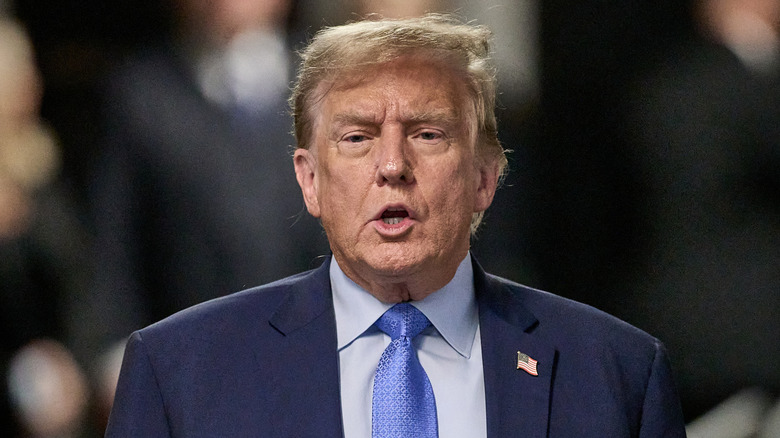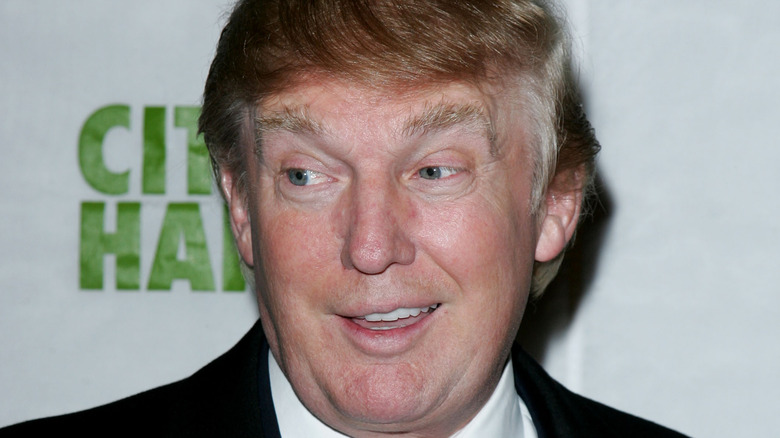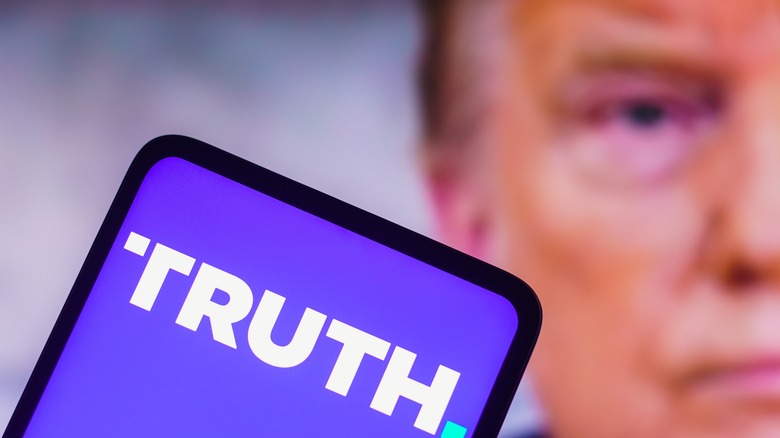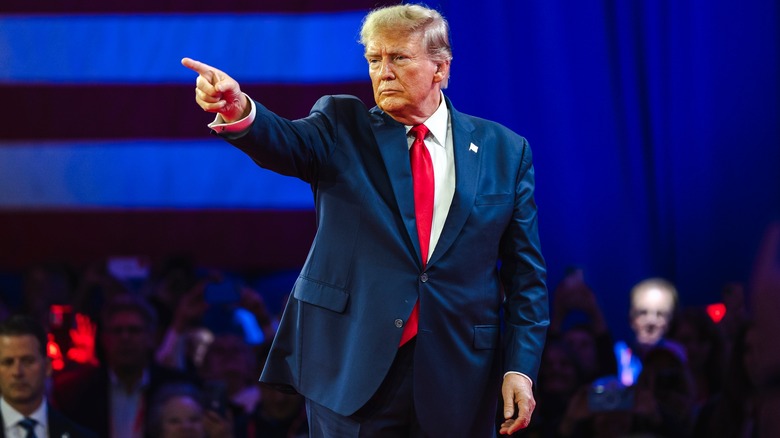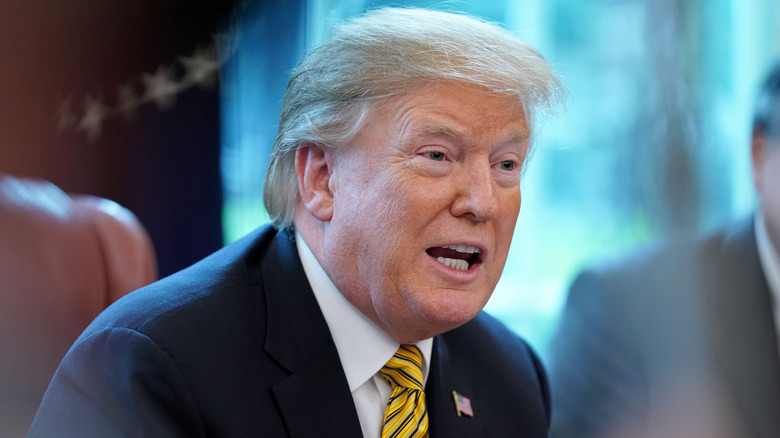Donald Trump Has A Long History Of Suing Media Outlets
While Donald Trump may have made history as the first president to ever face criminal charges, Trump and his family are no strangers to the legal system. Over the years, the biggest Trump family lawsuits have included bankruptcies, expensive divorces, and defamation. The judgments have run into the millions, like the 2023 E. Jean Carroll defamation case, where Trump was ordered to pay her $83 million, and the 2024 Trump Organization fraud lawsuit in New York where Trump was fined $355 million.
While Trump has been the defendant many times, he's also been on the other side of the table. USA Today has tracked active lawsuits connected to Trump — it's upward of 4,000 over more than 30 years. One category of Trump lawsuits includes him suing, or threatening to sue, media organizations — in 2013, his then-lawyer Michael Cohen reportedly sent an email to The Onion, notably a satirical website, accusing them of defamation and stating that the article in question should be taken down or, "I will take all action necessary to ensure your actions do not go without consequence," per The Onion.
While The Onion situation doesn't seem to have escalated into a lawsuit, there were several times that Trump has gone through with suing news organizations and journalists. During his time as president, Trump discussed how he wanted to make it easier to sue and to win in libel cases against the media. Here are some of the most notable cases filed over the years.
Donald Trump argued a 1984 column was defamatory
In 1984, Donald Trump sued The Chicago Tribune for $500 million. At issue was an article by the newspaper's architecture critic Paul Gapp in which he'd written about Trump's plan to build a 150-story skyscraper near the southern end of Manhattan — spoiler alert, Gapp didn't think it was a good idea. The ambitious project would have been the world's tallest building. But Gapp pointed out what felt to be the problems with the proposal for such a tall building with a narrow footprint. and in the article, he said it was "one of the silliest things anyone could inflict on New York or any other city," as reported by The New York Times. Gapp also wrote that "the availability of $1 billion for such an unprecedented and ego-propelled real estate gamble is not at all certain," per Chicago.
Trump's lawsuit argued that the article contained false information and it had caused him "embarrassment and financial harm," via The New York Times. However, in 1985, a judge dismissed the case. In the ruling, it was said that Gapp was entitled under the First Amendment to write his opinion about the project and that his columns weren't published as a factual article in the paper. Trump was also said to be within his rights to have a negative opinion of the article, as he referred to the newspaper's imagined rendering of the proposed building that accompanied the article as "an atrocious, ugly monstrosity."
Donald Trump didn't take kindly to claims he wasn't a billionaire
In 2005, Timothy L. O'Brien's book "TrumpNation: The Art of Being the Donald" came out, and in it, he wrote that with information from three anonymous sources, he estimated that Donald Trump was worth $150 million to $250 million. What Trump's actually worth has long been a point of discussion, and Trump didn't seem to appreciate the lowball figure that O'Brien used. So in January 2006, he sued O'Brien and Warner Books for $5 billion. In the lawsuit, it was argued by Trump's team that the valuation that O'Brien used to describe Trump's wealth was defamatory and had negatively impacted his business interests.
In a deposition for the case, Trump was asked by O'Brien's attorneys about his previous statements about his wealth and business dealings. At one point, Trump, who has long claimed billionaire status, said, "My net worth fluctuates, and it goes up and down with markets and with attitudes and with feelings, even my own feelings," per The Washington Post.
The case against O'Brien was dropped by a judge in 2009 and after an appeal by Trump, it was dropped again in 2011. Considering Trump's status as a public figure, defamation suits would have to show that the inaccurate and damaging information was published even though it was known to be false, and that wasn't found to apply to O'Brien or Warner Books.
Donald Trump's social media company sued multiple news outlets
After Donald Trump was suspended from Twitter and Facebook in the wake of his posts during and after the January 6, 2021 insurrection, he launched his own social media network — Truth Social. Truth Social had a bit of a bumpy rollout when it launched in February 2022, and then reporting in November 2023 about Truth Social led the Trump Media & Technology Group, of which Trump is the majority owner, to file a lawsuit in Florida against 20 different news outlets, including New York Daily News, Newsweek, and The Hollywood Reporter. The court documents, filed on November 20, 2023, claimed publications had worked together to "attack Trump Media & Technology Group ("TMTG") and its social media platform, Truth Social, by falsely reporting that TMTG had lost $73 million."
Several outlets updated their articles and amended the number to the more accurate loss amount of $31.6 million. The court filing confirmed that any updates were not enough — there were no retractions or accompanying apologies. A part of the lawsuit has to do with the timing of the inaccurate reporting as it came in the months before it became a publicly traded company. The lawsuit requests a jury trial and $1.5 billion in damages.
Trump's Truth Social lawsuits were in-house as well. Trump sued co-founders Wesley Moss and Andrew Litinsky, former contestants on "The Apprentice," in March 2024 saying that they'd mismanaged the company.
Donald Trump lawsuit against The New York Times that cost him cash
Donald Trump sued The New York Times in 2021 over reporting they did on him in 2018. The articles, one of which was titled "Trump Engaged in Suspect Tax Schemes as He Reaped Riches From His Father," included references to tax documents of Fred Trump, Donald's father, along with other financial records from the Trump family and organization. The authors won a Pulitzer Prize for their work.
The lawsuit, which was brought by Donald's lawyer Alina Habba, alleged that "the defendants engaged in an insidious plot to obtain confidential and highly sensitive records which they exploited for their own benefit and utilized as a means of falsely legitimizing their publicized works [...] motivated by a personal vendetta and [...] to advance their political agenda." Damages were requested at $100 million
Donald's lawsuit against The New York Times also included his niece Mary Trump. It accused her of being pursued by journalists from the newspaper and being pressed to collect confidential tax documents for them. The lawsuit against The New York Times was dismissed in May 2023, with the judge on the case writing, "Courts have long recognized that reporters are entitled to engage in legal and ordinary news-gathering activities [...] these actions are at the very core of protected first amendment activity," per The New York Times. Donald was ordered to pay the legal fees for the newspaper and the journalists that he'd sued — the total was $392,638.
Donald Trump sued The New York Times as president
Donald Trump seems to have a fairly clear dislike for The New York Times. On February 20, 2019, he tweeted "The New York Times reporting is false. They are a true ENEMY OF THE PEOPLE!" That was a month before a March 2019 opinion piece by Max Frankel about Trump's candidacy and the author's thoughts on his connections to Russia and Vladimir Putin.
That article may have been the last straw for Trump, who had been talking about suing the newspaper for years. In February 2020, Trump's re-election campaign sued The New York Times for defamation over the article, and it marked the first time Trump sued a media outlet while president. When he was asked in the White House pressroom about the lawsuit, Trump seemed to hint that there would be additional, similar lawsuits coming.
The Supreme Court of New York ended up dismissing the case in March 2021. One of the reasons was that it was an opinion piece and not presented as facts. At the time of the dismissal, David E. McCraw, a lawyer for The New York Times, told The Hill, "We should not tolerate libel suits that are brought by people in power intending to silence and intimidate those who scrutinize them."

